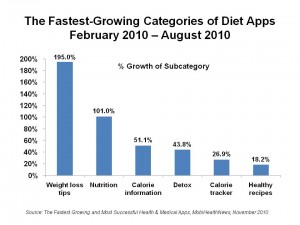 As health citizens the world over vow to lose N zillion pounds in this first week of 2011, they’ll go beyond buying into Weight Watchers’ tempting offer to join “for free” (not really, folks), purchasing Home Shopping Network’s “Today’s Special” Earth brand Exer-Trainer sneaker, and getting motivated by Jillian Michaels gut-busting workouts on The Biggest Loser (her last season, by the way). People wanting to lose weight will adopt mobile health apps in record numbers in 2011.
As health citizens the world over vow to lose N zillion pounds in this first week of 2011, they’ll go beyond buying into Weight Watchers’ tempting offer to join “for free” (not really, folks), purchasing Home Shopping Network’s “Today’s Special” Earth brand Exer-Trainer sneaker, and getting motivated by Jillian Michaels gut-busting workouts on The Biggest Loser (her last season, by the way). People wanting to lose weight will adopt mobile health apps in record numbers in 2011.
This category of mHealth apps is among the largest and most downloaded apps available. By the fourth quarter of 2011, most phones on the street will be smartphones, and millions of health apps will be downloaded for iPhones, Droids, Pre’s and Blackberry’s. In my whitepaper for California HealthCare Foundation, How Smartphones Are Changing Health Care for Consumers and Providers, published in April 2010, I cited MobiHealthNews‘ data point that 11% of medical reference apps in the Apples iTunes Store fell into the diet category. MobiHealthNews’ latest data, published in November 2010, found that category grew 91% between early February 2010 to late August 2010. The diet category is the catch-all group for healthy eating and food tracking apps, according to MobiHealthNews’ definition. The major issues dealt with in this category are weight loss tips, followed by nutrition, calorie tracking and information, healthy recipes, and detoxing. The average price for these ranges from a low of $1.26 for a calorie tracker to a high of $4.78 for nutrition.
The top diet app is Calorie Counter & Diet Tracker by MyFitness Pal, followed by Lose It! from FitNow and Weight Watchers Mobile, all ranked within the top 10 apps for Health and Fitness.
Health Populi’s Hot Points: An app won’t be a panacea for weight loss, among the most recidivist health behaviors for humans. Still, the 24×7 nature of food choices, and ability to access tools and nutrition information via mobile phone, will be useful adjuncts for 2011’s weight watching consumers. Furthermore, social networking support, where the diet-challenged can meet up with ‘friends’ (either real or virtual) can also be a boon to keep us on-track. Social networks have been found, in workplaces and online, to help bolster weight loss outcomes as well as help to keep weight off over time.
Good luck to those Health Populi readers downloading weight loss, calorie counting, nutrition informing, and exercise inspiring health apps in 2011. Do let me know over the course of the year how these apps have helped you — or not…




 Interviewed live on BNN Bloomberg (Canada) on the market for GLP-1 drugs for weight loss and their impact on both the health care system and consumer goods and services -- notably, food, nutrition, retail health, gyms, and other sectors.
Interviewed live on BNN Bloomberg (Canada) on the market for GLP-1 drugs for weight loss and their impact on both the health care system and consumer goods and services -- notably, food, nutrition, retail health, gyms, and other sectors. Thank you, Feedspot, for
Thank you, Feedspot, for  As you may know, I have been splitting work- and living-time between the U.S. and the E.U., most recently living in and working from Brussels. In the month of September 2024, I'll be splitting time between London and other parts of the U.K., and Italy where I'll be working with clients on consumer health, self-care and home care focused on food-as-medicine, digital health, business and scenario planning for the future...
As you may know, I have been splitting work- and living-time between the U.S. and the E.U., most recently living in and working from Brussels. In the month of September 2024, I'll be splitting time between London and other parts of the U.K., and Italy where I'll be working with clients on consumer health, self-care and home care focused on food-as-medicine, digital health, business and scenario planning for the future...